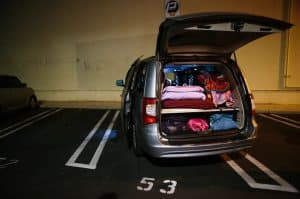BY SAM WATERSTONE | LEER EN ESPAÑOL
Santa Barbara is nationally recognized for its world-class weather, beaches, and restaurants; as a place where famous celebrities live, professional athletes train, and top academics conduct important research. And while it might not be as flashy, Santa Barbara’s thriving nonprofit sector is also quite noteworthy, having produced a number of innovative social service programs that provide other agencies around the country with a template for success.
One of these pioneering agencies is New Beginnings Counseling Center, a Santa Barbara-based nonprofit that has supported vulnerable residents for 50 years and is the national leader with their innovative Safe Parking Program® (SPP). Safe parking programs are an important part of the effort to reduce homelessness, especially in places like California, where affordable housing in coastal cities is extremely limited.

“During the 2019 Point in Time Count, 42% of the identified unsheltered homeless population in Santa Barbara County were living in their vehicles,” said Michael Berton, Development Manager at New Beginnings. “Vehicular homelessness is a kind of hidden homelessness – it’s much more prevalent than most people think.”
Celebrating its fifteenth year, New Beginnings’ SPP was the first of its kind in the United States. The program provides clients with free, monitored overnight parking spaces and case management services, ensuring their safety while also helping them transition into permanent housing. Each night, New Beginnings serves roughly 150 people across 24 lots in Santa Barbara, Goleta and the unincorporated region in between.
In order to qualify for the program, clients must be without housing and have a valid driver’s license, registration, and car insurance. The program has evolved to include a Rapid Re-housing component, meaning that program staff help clients secure permanent housing through time-limited financial assistance and targeted supportive services. The program is designed to provide temporary shelter and safety for clients while they work with case managers to secure permanent housing and address other pressing needs.
“We have case managers on staff that work with clients individually to increase their income, fill out job applications, and become connected to other community services,” Berton explained. “A lot of the time, clients need medical or dental assistance, or their car has broken down, and we’ve gotten grants from organizations to help us fund these areas.”
SPP clients come from all different backgrounds. Some are families or couples struggling to get by; many are elderly individuals in need of support. In 2017, 21% of New Beginnings’ SPP clients who received shelter and case management were over the age of 63.
“Everyone has a pretty remarkable story about how they got there,” noted Berton, who recently met with several SPP clients. “For example, Safe Parking recently enrolled a woman in her 90s who had been evicted from her home and had nowhere else to go. Another women was dealing with medical issues and living in her car with her dog. Her husband had been deported to Guatemala, so she was sending money back to him.”
Earlier this year, a bill was introduced into the California state legislature that, if passed, would require all cities and counties with a population of 330,000 or more to collaborate with nonprofits to implement safe parking programs by 2022. While this is a promising development, the need for such programs reflects policymakers’ inability to adequately address the twin issues of affordable housing and homelessness in California. The Bay Area and Los Angeles represent the most striking examples of this statewide crisis, but smaller destination cities like Santa Barbara are also struggling to agree on important details regarding how and where to build more affordable, single-family dwellings. It is clear that tackling large-scale economic inequality is the only way to truly solve homelessness, but in the short term, safe parking programs are an effective way to provide immediate shelter and safety for those in need.
Since its inception, New Beginnings’ Safe Parking Program has been the subject of news features from prominent national and international media outlets, including VICE News, the LA Times, and Rolling Stone magazine. More importantly, the program has helped many individuals get back on their feet and into permanent housing, and is now assisting other agencies in replicating their model. New Beginnings offers a comprehensive Safe Parking Manual, which is being utilized by agencies throughout North America as a template for how to start their own successful safe parking programs.
“Safe Parking is an innovative program that takes existing community resources – empty parking lots – and repurposes them to meet a critical community need: vehicular homelessness,” said Kristine Schwarz, Executive Director of New Beginnings. “We have a long history of combining government, nonprofit, for-profit, faith-based and philanthropic resources to end homelessness, and we appreciate the role that the Santa Barbara Foundation has played in furthering these partnerships.”
The Santa Barbara Foundation awarded New Beginnings a 2017 Core Support for Basic Needs grant, and is also a sponsor of the agency’s Coral Casino Luncheon Series, which educates the public about the most critical social and human service issues in our community. Outside of Safe Parking, New Beginnings also runs a Supportive Services for Veteran Families Program, a Life Skills Parenting and Education Program, and a Community Mental Health Center, serving more than 2,000 people annually.
New Beginnings Counseling Center has received $157,650 in grants from SBF over the past five years. To learn more about New Beginnings’ Safe Parking Program and other community resources, visit sbnbcc.org.